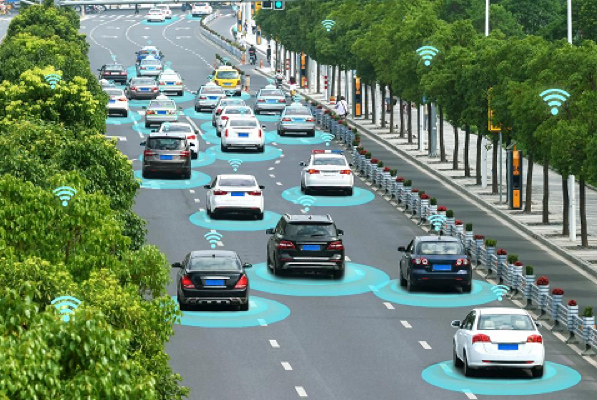A look at the top 7 digital transformation trends in the automotive industry.
Technological advancements and digital transformation are increasingly changing the automotive industry. When it comes to gaining an advanced and better experience, consumers are becoming more demanding, which is why automotive companies are striving to revamp their technological and digital offerings.
Digitization is increasing investments in the automotive industry. Companies in the industry understand that they must transform to meet consumer demands, just like any other industry going digital. The current digital transformation trends in the automotive industry are very impressive, which is good given the increasing appetite for a digitally enhanced experience among consumers.

Digital technology is taking over the automotive industry, with digitization putting it in a state of constant transition at the same time.
Few people today can imagine living without network connectivity. Most activities that people perform every day are slowly going digital. According to research findings, up to 76% of organizations are investing in emerging digital technology in order to stay competitive. In addition, AI will handle 15% of all customer service transactions, according to Gartner, by the year 2021, which is an increase of about 400% from 2017.
Modern consumers want full digital connectivity. Their expectations and constantly changing needs are proving to be a challenge for manufacturers, including automotive manufacturers. The focus today is on connected vehicles. Automobile manufacturers are moving beyond automation to a more advanced form of digitized factory, which can produce millions of lines of code for each connected automobile.
Consequently, the automotive industry is adopting new trends every year. The top 7 digital transformation trends in the automotive industry are:
Connectivity is the word that perfectly matches the current vibe. It is more than a nice addition. It is a necessity demanded by consumers.
Many drivers today want access to apps, music, and social media accounts while driving. Essentially, they do not want to experience any restrictions. To fulfill their wishes and needs, vehicle manufacturers are striving to build vehicles that give drivers the ability to conduct their business and keep up with their social lives while driving.
Just a few years ago, people were dreaming about owning cars with Wi-Fi connectivity. Today, such vehicles are widely available because of the constant need for digital connectivity among younger vehicle buyers. Manufacturers are quickly realizing that it is now difficult to market or sell cars without such connectivity features.
About 74% of business executives believe that by 2030, the level of production in Western Europe will fall below 5%, a 60% drop from 2017.
This reduction will allow for more transparency in the supply chain and lower costs as well. It will also speed up the processes of design, manufacturing, and delivery. Additionally, the possibilities provided by improved connectivity will allow for direct feedback to a factory. The improvements to performance, flexibility, and production will overcome the obstacles in building smart factories.
This solution provides amazing results, such as prediction of failure in advance and improvements of more than 30% in maintenance uptime.
This technology collects data on vehicle performance, uploads it to the cloud, and assesses any risks of potential failure of a vehicle’s software and/or hardware. After processing the data, the driver will get a notification and advice about any necessary maintenance or service to avoid accidents or incidents. Essentially, predictive maintenance technology eliminates the need for guesswork.
The automotive industry is the world’s second most data-driven industry, which is why manufacturers work with software development firms.
Modern smart cars collect data on traffic patterns, drivers, their frequent destinations, and much more. This data is useful when it comes to engaging and communicating with drivers. Connected systems, however, needs to be secure to protect driver information. This is why manufacturers are constantly looking for new advancements in protection and security.
Uber has been enjoying massive success in its niche after shifting focus to service-oriented forms of mobility from privately owned cars.
Vehicles are becoming a key component of connected living. In addition to providing some financial relief, startups such as Uber eliminate huge expenses such as the cost of buying a car, licensing, and maintenance.
2020 will be another exciting year of challenges and transformations that will take the world several steps closer to a digitally advanced future.
Much sooner than most people think, advancements being tested and/or used in the industry will be quite common. Digital transformation is also beneficial for the environment as well as drivers. Manufacturers still need to overcome many challenges; however, the automotive industry is changing for the better and for good.
In London’s Audi Virtual Showrooms, only a few cars are on display; instead, they use massive video screens to display buying information.
The process of purchasing a car used to be stressful, with the stereotype of the annoying salesperson proving to be true. Buyers were often ill informed and most felt pressured when purchasing a new car. Thanks to modern digital technology, however, buyers can research their preferred car online before visiting a dealership.
2020 should be a surprising and exciting year for consumers since IoT, artificial intelligence, Blockchain, and other digital technologies are already making waves in other industries. Such technologies are set to make an impact in the automotive industry as well.
About the Author
Natalie Crawford is a former English teacher, climate enthusiast, and a successful freelance writer at Domyhomework123.com. She loves skiing and hiking, but won’t refuse to have a cup of coffee and read a nice book in the evening.
Scott Ellyson, CEO of East West Manufacturing, brings decades of global manufacturing and supply chain leadership to the conversation. In this episode, he shares practical insights on scaling operations, navigating complexity, and building resilient manufacturing networks in an increasingly connected world.